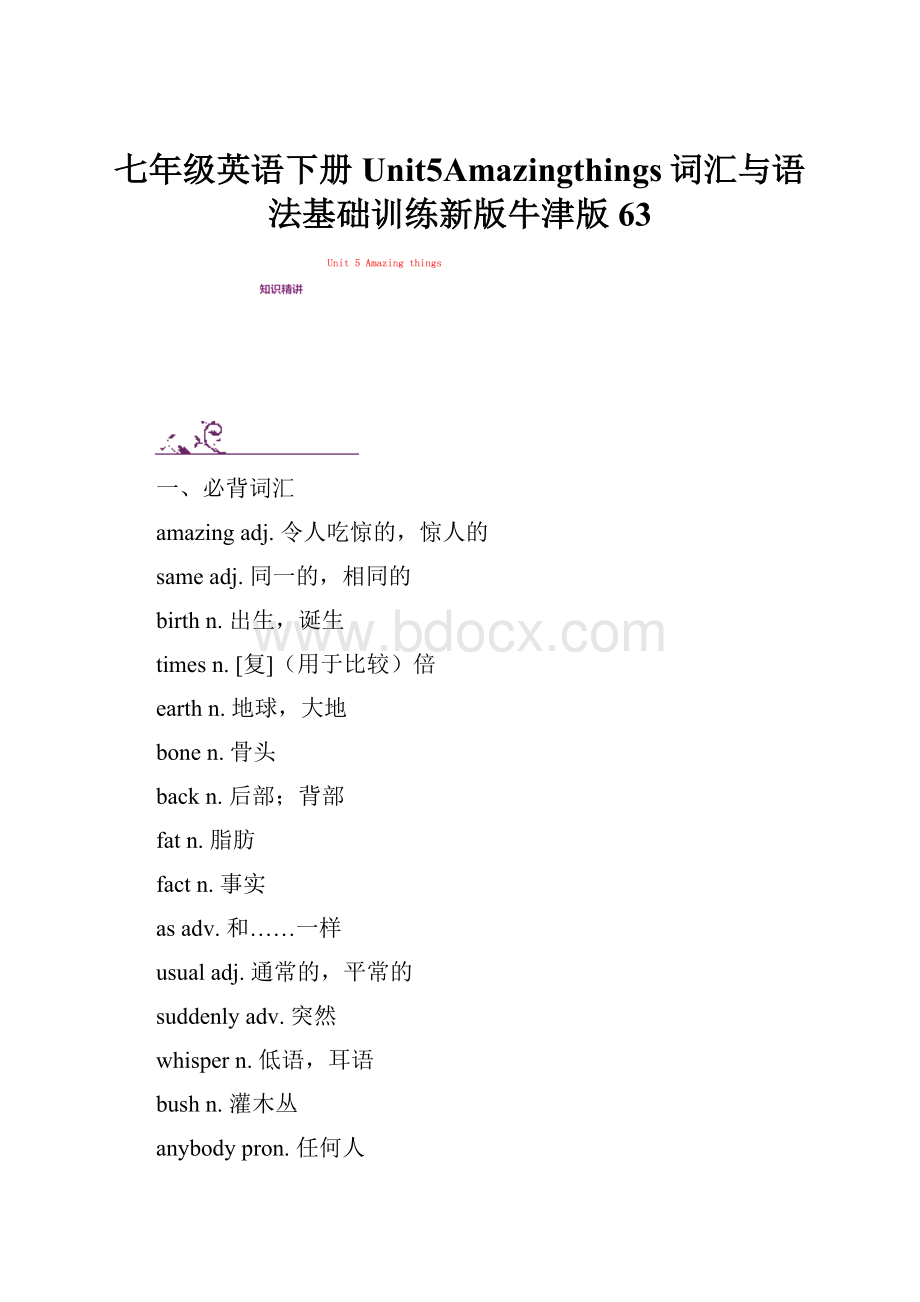七年级英语下册Unit5Amazingthings词汇与语法基础训练新版牛津版63.docx
《七年级英语下册Unit5Amazingthings词汇与语法基础训练新版牛津版63.docx》由会员分享,可在线阅读,更多相关《七年级英语下册Unit5Amazingthings词汇与语法基础训练新版牛津版63.docx(17页珍藏版)》请在冰豆网上搜索。

七年级英语下册Unit5Amazingthings词汇与语法基础训练新版牛津版63
一、必背词汇
amazingadj.令人吃惊的,惊人的
sameadj.同一的,相同的
birthn.出生,诞生
timesn.[复](用于比较)倍
earthn.地球,大地
bonen.骨头
backn.后部;背部
fatn.脂肪
factn.事实
asadv.和……一样
usualadj.通常的,平常的
suddenlyadv.突然
whispern.低语,耳语
bushn.灌木丛
anybodypron.任何人
nobodypron.(=noone)没有人,无人
replyvi.答复,回答
strangeadj.奇怪的;陌生的
leavevt.离开
quicklyadv.迅速地,飞快地
happenvi.发生
everythingpron.每件事,每样事物,一切
wondervi.&vt.琢磨,想知道;感到诧异
carefullyadv.仔细地,认真地,小心地
searchvt.&vi.搜查,搜寻,搜索
himselfpron.他自己
weakadj.虚弱的,无力的
miaowvi.(猫叫声)喵
pickvt.拾起
surprisedadj.吃惊的,惊讶的
lateradv.随后,后来
somebodypron.某人,有人
agoadv.以前
centimetren.(=cm)<英>厘米,公分=<美>centimeter
dodon.渡渡鸟
snaken.蛇
cameln.骆驼
antn.蚂蚁
littlepron.&det.不多的,少数的
dryadj.干的;干燥的
withoutprep.没有
chalkn.粉笔
sandwichn.三明治
byprep.不迟于,在……之前
usen.使用,利用;用途
perprep.每,每一
inchn.英寸
二、重点词汇
1.amazingadjective/əˈmeɪ.zɪŋ/
extremelysurprising
令人惊诧的,惊人的;令人惊喜的
例句:
Theamazingthingisthatitwaskeptsecretforsolong.
令人诧异的是,这件事竟然保密了那么长时间。
Thisstainremoverreallyworks-it'samazing!
这种去污剂很有效——真想不到!
2.replyverb&noun./rɪˈplaɪ/
v.
1).toanswer
回答;回复;答复
例句:
ItrytoreplytolettersthedayIreceivethem.
我尽量在收到信的当天就回信。
2).toreacttoanactionbysomeoneelse
作出反应;回应
例句:
Sherepliedtothethreatsbygoingtothepolice.
她受到威胁后便去报了警。
n.
ananswer
回答;回复;答复
例句:
Iaskedwhy,buthemade/gavenoreply.
我问为什么,但是他没有回答。
3.wonderverb&noun./ˈwʌn.dər/
v.
1).toaskyourselfquestionsorexpressawishtoknowaboutsomething
疑惑;想知道
例句:
He'sstartingtowonderwhetherhedidtherightthinginacceptingthisjob.
他现在开始怀疑自己接受这份工作是否正确。
2).usedinphrases,atthebeginningofarequest,tomakeitmoreformalandpolite
(用于短语中,使某一请求更加正式和礼貌)不知能否…
例句:
Iwonderifyoucouldgivemesomeinformationaboutplacestovisitinthearea?
不知你能否给我提供一些这个地区可供游玩的地方的情况。
n.
1).afeelingofgreatsurpriseandadmirationcausedbyseeingorexperiencingsomethingthatisstrangeandnew
惊讶;惊叹
例句:
TheboysgazedinwonderattheshinyredFerrari.
男孩子们惊讶地盯着那辆锃亮的红色法拉利跑车。
2).anobjectthatcausesafeelingofgreatsurpriseandadmiration
奇观;奇迹;奇事
例句:
WespentaweekvisitingthewondersofAncientGreekcivilization.
我们花了一周时间游览古希腊文明的奇观。
4.withoutpreposition&adverb/wɪˈðaʊt/
nothavingordoingsomething,orlackingsomething
没有;无;缺少
例句:
Ileftwithoutmyumbrella.我没有带伞就出来了。
Hewentwithoutmyknowledge.他没有让我知道就去了。
Youshouldn'tdriveformorethanthreehourswithouttakingabreak.
你不该连续开车3个多小时而不休息。
5.strangeadjective/streɪndʒ/
1).unusualandunexpected,ordifficulttounderstand
不寻常的;奇怪的;不可思议的
例句:
Ihadastrangefeelingthatwe'dmetbefore.
有个奇怪的感觉,觉得我们以前见过面。
2).notknownorfamiliar
陌生的,不熟悉的
例句:
Withsomanystrangefacesaroundher,thebabystartedtocry.
看到周围有这么多的陌生面孔,婴儿开始哭了起来。
三、必背短语
asusual照例,像往常一样sitdown坐下
turnaround转身;(使)翻转saytooneself自言自语
pickup拿起,举起runaway逃离,跑开
thedaybeforeyesterday前天beafraidof害怕
notanymore再也不,不再hearof听说,知道
theotherday那天,前几天atthesametime同时
allovertheworld遍及全世界atleast至少
askfor请求;要stopdoingsomething停止做某事
onsomeone'sway在……路上ontheway在……路上
四、经典句型
1.Fishsleepwiththeireyesopen.
鱼睁着眼睛睡觉。
2.Oureyesarethesamesizefrombirth,butournoseandearsneverstopgrowing.
我们的眼睛从生下来就没有变过,但我们的鼻子和耳朵从没有停止过生长。
3.TheSunisover1,300,000timeslargerthantheEarth.
太阳的体积是地球的约130万倍。
4.Isn'tthatamazing?
是不是很神奇啊?
5.Theyturnedaroundbutsawnothing.
他们转过身但是什么也没看见。
6.NowIamnotafraidofanimalsanymore.
现在我再也不害怕动物了。
三点剖析
一、考点
一般过去时的基本用法和动词过去式的构成
1.一般过去时的基本用法
1).过去某个时间里发生的动作或状态。
常与表示过去时间的状语yesterday,lastnight,anhourago,justnow,in2006等连用。
例句:
Hewenttothetheatrelastnight.昨天晚上他去了剧院。
2).过去习惯性、经常性的动作、行为。
常与always,often等连用。
例句:
Healwaysplayedbasketballwithhisfriendswhenhewasachild.
当他小的时候经常和朋友们一起打篮球。
2.动词过去式的构成
动词过去式变化规则:
1).一般情况下,直接在结尾加-ed.Eg.:
cook-cooked
2).以e字母结尾的动词,加-d.Eg.:
taste-tasted
3).以辅音字母+y结尾的动词,把y变i加ed.Eg.:
study-studied
4).“辅元辅”结构的动词,双写尾辅音字母加-ed.Eg.:
stop-stopped
5).常见不规则动词过去式:
am,is-was,are-were,do-did,see-saw,say-said,give-gave,get-got,go-went,come-came,have-had,eat-ate,take-took,run-ran,sing-sang,put-put,make-made,read-read,write-wrote,draw-drew,drink-drank,fly-flew,ride-rode,speak-spoke,sweep-swept,swim-swam,sit-sat,think-thought
二、易错点
1.hear,listen与sound
1).hear动词,表示“听见;听到”,但不一定是有意识地听,强调听的结果。
例句:
Canyouhearwhathesaid?
你能听见他说的话吗?
2).listen表示有意识地听,仔细听,但不一定听到什么,强调听的动作。
可以单独使用,以提醒对方的注意;若跟宾语时需要在listen后加介词to。
例句:
Shelistenedbutheardnothing.她听了听,可什么也没听见。
Listentotheteachercarefullyinclass.在课上认真听老师讲课。
3).sound意为“听起来”,常作系动词,后面常跟形容词或like短语。
例句:
Thatsoundslikeagoodplan.那听起来像是个好计划。
Thatsoundsgreat.那听起来好极了。
2.few,afew,little,alittle
修饰可数名词
修饰不可数名词
含义
few
little
否定含义,几乎没有
afew
alittle
肯定含义,还有一些
例句:
Hehasafewfriends.他有几个朋友。
Hehasfewfriends.他几乎没有朋友。
Westillhavealittletime.我们还有点时间。
Thereislittletimeleft.几乎没剩下什么时间了。
题模精选
题模一:
Unit5词汇应用
例1.1.1---DoyoulikethesongsbyTaylor?
---Yes.Countrymusic_________niceandfulloffeelings.
A.sounds
B.listens
C.hears
D.looks
例1.1.2根据句意及首字母或中文提示写出单词。
1).Thelittlegirlisa_________togooutaloneatnight.
2).Wearehavinganimportantmeeting._________(突然),afatwomancomesinandshoutsatus.
3).Ihope_________(每件事)goeswell.
题模二:
一般过去时
例1.2.1---When_________you_________here?
---Twodaysago.
A.did;come
B.have;come
C.will;come
D.do;come
例1.2.2翻译句子。
1).一个月前,他么去了奇趣世界博物馆。
________________________________________________
2).你们再回家的路上还看到了什么其他的?
________________________________________________
随堂练习
随练1.1It'ssaidthat_________11-year-oldgirlsaw_________UFOyesterday.
A.an;an
B.a;an
C.an;a
D.a;a
随练1.2Wearealltired.Let's_________arest.
A.tostophaving
B.stophaving
C.tostoptohave
D.stoptohave
随练1.3Iwenttothedoorand_________,butIdidn't_________thesoundoftheknock.
A.heard;listen
B.listened;hear
C.heard;listento
D.listenedto;hear
随练1.4Amygetsupearlynow.Sheis_________lateforschool_________.
A.no;anymore
B.not;anymoney
C.any;nomore
D.any;notmore
随练1.5根据句意及首字母或中文提示写出单词。
1.Howmany_________(骨头)arethereinaman'sbody?
2..Mybrotherwenttoschoolw_________breakfast.Soheisveryhungrynow.
3.Youshouldlistentoyourteachersc_________inclass.
4.---Doyoufeelafraidwhenyousee_________(蛇)?
---No,Ilikethem.
5.How_________(奇怪的)thecatis!
Ithasonlythreelegs.
6.Ourteachersusuallyuse_________towritewordsontheblackboard.
7.---YesterdaywasSunday.Whatdaywastheday_________yesterday?
---ItwasSaturday.
8.Weallknowameterhas100_________.
9.---Didyousee_________(渡渡鸟)once,Dale?
---No,Ididn't.
10.---Whath_________hereyesterday?
---Sorry,Idon'tknow.
随练1.6Whatasurprisetoseeyouhere!
When_________you_________back?
A.do;get
B.did;get
C.have;got
D.will;get
自我总结
课后作业
作业1---Therearesomethingsonthefloor.Willyou_________,Jack?
---OK,Mrs.Wang.
A.pickthemup
B.pickitup
C.pickupthem
D.pickupit
作业2---Whatdidthestudentsseeinthepark?
---Theyturned_________butcouldnotsee_________.
A.around;nothing
B.round;nothing
C.around;anything
D.round;something
作业3Theoldmanis_________tohearaboutthe_________storyintoday'snewspaper.
A.surprised;surprised
B.surprised;surprising
C.surprising;surprised
D.surprising;surprising
作业4Rosefinishedherstudyintheuniversityandwentto_________agoodjob.
A.takeafter
B.lookafter
C.carefor
D.searchfor
作业5---Imetmyaunt_________yesterday.
---Youmustbeveryhappytoseeeachother.
A.onmywayhome
B.onmywaytohome
C.inmywayhome
D.inmywaytohome
作业6翻译句子。
1.蚂蚁的嗅觉很灵敏。
________________________________________________
2.长颈鹿的长脖子中只有七块骨头。
________________________________________________
3.骆驼住在很干燥的地方。
________________________________________________
4.那天我在公园看到一条蛇,我再也不去那儿了。
________________________________________________
5.感谢你的帮助,现在我知道应该保持房间清洁了。
________________________________________________
6.昨天他看了电视,了解了更多关于月球的事。
________________________________________________
答案解析
题模精选
题模一:
Unit5词汇应用
例1.1.1
【答案】A
【解析】考查系动词辨析,句意:
——你喜欢泰勒唱的歌吗?
——是的。
乡村音乐听起来很优美,充满了感情。
sound“听起来”;listen“听”;hear“听到”;look“看起来”。
根据题意可知故选A。
例1.1.2
【答案】1).afraid
2).Suddenly
3).everything
【解析】考查本课词汇的应用,需注意联系语境、时态、人称的数及名词的单复数。
题模二:
一般过去时
例1.2.1
【答案】A
【解析】考查动词时态,根据Twodaysago可知问句问的是过去发生的动作,须用一般过去时态,故选A。
例1.2.2
【答案】1).Amonthago,theywenttotheFunWorldMuseum.
2).Whatelsedidyouseeonyourwayhome?
【解析】考查本课语法的应用,需注意联系语境、时态、人称的数及名词的单复数。
随堂练习
随练1.1
【答案】C
【解析】考查冠词,句意:
据说一个11岁女孩昨天看到了一个不明飞行物。
第一空11-year-old以元音因素开头,不定冠词用an;第二空UFO以辅音音素开头,不定冠词用a。
故选C。
随练1.2
【答案】D
【解析】考查固定搭配,句意:
我们都累了,咱们停下来休息一下根据letsb.dosth.“让某人做某事”排除A和C;stopdoingsth.停止做某事;stoptodosth.停下来去做某事。
故选D。
随练1.3
【答案】B
【解析】考查动词及词组辨析,句意:
我走到门口去听,但我没有听到敲门声。
listen“听”,强调听的过程;hear“听见”,强调听的结果;listento“听……”,后要接宾语。
故选B。
随练1.4
【答案】B
【解析】考查固定搭配,句意:
Amy现在起床早了,她上学不再迟到了。
not…anymore“不再”。
故选B。
随练1.5
【答案】1.bones
2.without
3.carefully
4.snakes
5.strange
6.chalks
7.before
8.centimeters
9.dodos
10.happened
【解析】考查本课词汇的应用,需注意联系语境、时态、人称的数及名词的单复数。
随练1.6
【答案】B
【解析】考查动词时态,句意:
在这里见到你真的很惊讶!
你是什么时候回来的?
根据上文的seeyouhere可推知“已经回来了”,所以想知道是过去什么时候回来的,应用一般过去时。
故选B。
课后作业
作业1
【答案】A
【解析】考查固定搭配,句意:
——地上有些东西。
杰克,你把它们捡起来好吗?
——好,王老师。
代替上文提到的可数名词复数,用them,排除B和D;pickup是“动词+副词”构成的动词短语,当代词作宾语时,代词应位于副词之前,排除C。
故选A。
作业2
【答